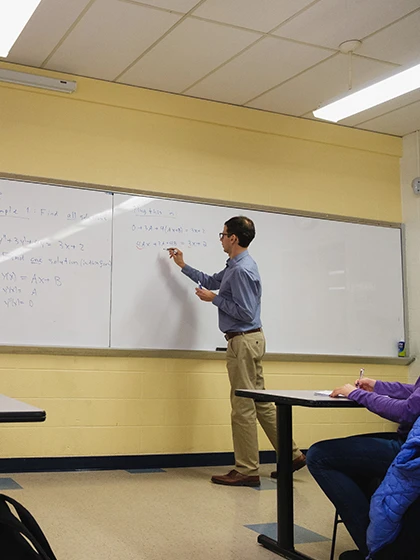/mathematical-sciences-phd-1800x5404187397c-d030-42e5-ae3c-863fd200a2a8.webp?sfvrsn=c7bd513d_6)
/mathematical-sciences-phd-1800x5404187397c-d030-42e5-ae3c-863fd200a2a8.webp?sfvrsn=c7bd513d_6)

Mathematical Sciences
Ph.D.
Ph.D. in mathematics
Our doctoral program, ranked 4th in Michigan for Best Graduate Schools in 2025, equips graduates with the skills to conduct impactful research and excel in teaching collegiate mathematics. Earning a Ph.D. in mathematics opens doors to corporate careers or faculty positions, providing both advanced research expertise and the ability to teach college-level mathematics effectively.
AT A GLANCE
Why choose a doctorate in mathematical sciences?
Our Ph.D. in mathematics offers an exceptional opportunity to delve into advanced topics while preparing you to lead high-level research. You can specialize in mathematics or mathematics education research.
You'll have the opportunity to work closely with faculty and other graduate students as you get the intensive training needed to teach college-level math effectively and lead your own independent research. You'll also have the opportunity to prepare for careers outside of academia by developing a broad knowledge base or by concentrating on specific areas of interest.
Highlights of our Ph.D. in mathematics
- Prep for your teaching career: Take part in two semester-long teaching internships, teaching math under the guidance of an experienced faculty member. All students complete a full year of classes to learn college-level math instruction.
- Hear from other experts: Attend expert-led colloquium programs and research seminars to enhance your knowledge and network with speakers. Explore more through our active colloquium and research seminars.
- Grow your network: Participate in active student groups such as our AMS Graduate Student Chapter.
- Find your focus: Explore topics beyond your required coursework through graduate student seminars. Our doctoral students have the choice of writing a dissertation in either mathematics or collegiate mathematics education.
Concentrations
Collegiate Mathematics Education
This program equips you to confidently teach college-level mathematics through hands-on training, mentorship and research opportunities. You will gain valuable experience in upper-level math instruction by completing two semester-long teaching internships and collaborating closely with experienced faculty.
The curriculum emphasizes pedagogy and effective teaching strategies, focusing on integrating technology, fostering cooperative learning and applying inquiry-based methods. Faculty and students actively study how technology impacts teaching, what drives student motivation in math and how gender and culture influence learning. They also research global math applications, quantitative literacy and reasoning.
Mathematics
With the mathematical sciences Ph.D. concentration, you'll pursue broad knowledge or specialize in-depth in certain areas of interest and prepare to work effectively in non-academic settings. Areas of study include algebraic geometry, combinatorics and graph theory, differential geometry, functional analysis, number theory and many others.
What can you do with a Ph.D. in mathematics?
Earning a Ph.D. in mathematical sciences opens up a wide range of possibilities for graduates. You'll be prepared for faculty roles, corporate careers, government research roles and more. Since 2000, more than 50 students have graduated from this program, taking jobs in 20+ states and 6+ countries.
| Career | Projected Salary |
|---|---|
| College Professor/Instructor | $84,380 |
| Data Analyst (General) | $72,247 |
| Financial Quantitative Analyst | $99,890 |


Mathematical Association of America Fellows
Three recent CMU graduates with Ph.D.s in mathematics, Hiruni Pallage, Bridgette Russell and Christal Schoen, have been honored as 2024 MAA Project NExT fellows!
The Mathematical Association of America's (MAA) Project NExT (New Experiences in Teaching) program is designed to support new Ph.D.s in mathematics as they begin their careers in teaching and research.
Request Information about CMU
By submitting this form, I agree to receive calls, emails and/or text messages from Central Michigan University to discuss furthering my education.